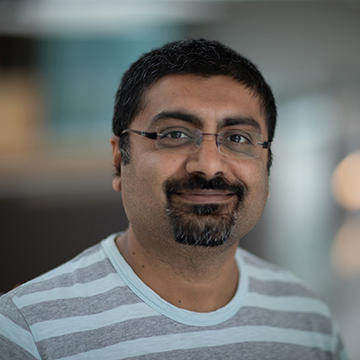Shabaz Mohammed

Professor Shabaz Mohammed
Associate Professor of Proteomics
Proteins are central to many essential molecular processes in living cells. They perform functions through interactions in a highly dynamic environment with each other and with other types of molecules including sugars, lipids and nucleic acids. In recent years, characterisation of proteins has accelerated dramatically, driven by the completion of many genomes and the constant evolution of mass spectrometry. The genome contains information relating to all possible proteins that can be present in the cell and thus this extractable data represents an invaluable repository of knowledge for protein identification. Equally significant was the realisation that mass spectrometry represents an almost ideal tool for protein sequencing. However, the composition of proteins present in a cell is only one determinant of function. Both protein expression levels and subtle biochemical changes to protein structure, in the form of post-translational modifications (PTM), dynamically influence cellular processes. PTM of proteins is nature’s way to regulate protein function, their interactions and sub-cellular localisation. Furthermore, proteins involved in regulation are becoming major drug targets for a wide variety of diseases. Therefore, the accurate measurement of protein expression and modification is essential to understanding the underlying biomolecular determinants of cellular signalling. My group’s current areas of interest are:
Novel mass spectrometers
We are creating new approaches to characterise protein post-translational modifications on a proteome-wide scale. We are involved in developing new instrumentation that can accommodate new modes of ion fragmentation including multiple light-, electron- and classical collision- based approaches. Furthermore, we want to characterise the ion fragmentation chemistry in order to develop automated tools for analysis.
Developing chromatographic techniques for application in a proteomics environment
We are improving the sensitivity of cutting-edge experiments with the goal of reaching single cell proteomics. It is little appreciated that the rate and power of MS analysis is outstripping the key chemical techniques that are coupled to it. One of the understated and most powerful aspects of the proteomics experiment is the peptide/protein chromatographic separation, new modes in chromatography have the power unleash the power of MS. We are creating new ultra-high-performance separations for proteomics that are being applied to a range of pertinent biochemicals. One key aspect is our interest in creating ultra-narrow columns which operate at low flow rates (a few nanolitres per minute) to maximise sensitivity.
Enrichment and Labelling of Proteins and their Post Translational Modifications
In conjunction with the Ben Davis group, we are developing materials for the detection, enrichment and quantification of protein post-translational modification such as glycosylation and phosphorylation. These materials operate in several contexts including columns, beads as well as in cellulo.
Proteomics Applications
We work with a number of groups across the university in order to apply our tools. We are addressing questions related transcription (most recently how SARS-CoV-2 remodels the cell), cell cycle, transportation as well as several cell receptors and signalling pathways.
Shabaz studied Chemistry at UMIST (now The University of Manchester) and obtained his degree in 1999. He then went on to work in the laboratory of Simon Gaskell within the field of biological mass spectrometry albeit the more fundamental side of the topic and defended in early 2003. He then moved to Odense (Denmark) and joined the group of Ole Jensen and worked on technology development for use in studying post-translation modifications. Here, he helped develop a method that allowed quantitative analysis of phosphorylation and its role in cellular signalling, a widely adopted method. In 2005, he moved to the laboratory of Albert Heck and continued working in the field of proteomic technologies. In 2008, he became an Assistant Professor and started his own group. In 2013, he (once again) moved and is now an Associate Professor of Proteomics in the Departments of Chemistry and Biochemistry. In 2020, he was seconded to the Rosalind Franklin Institute where he will be Head of the Mechanistic Proteomics research programme.




